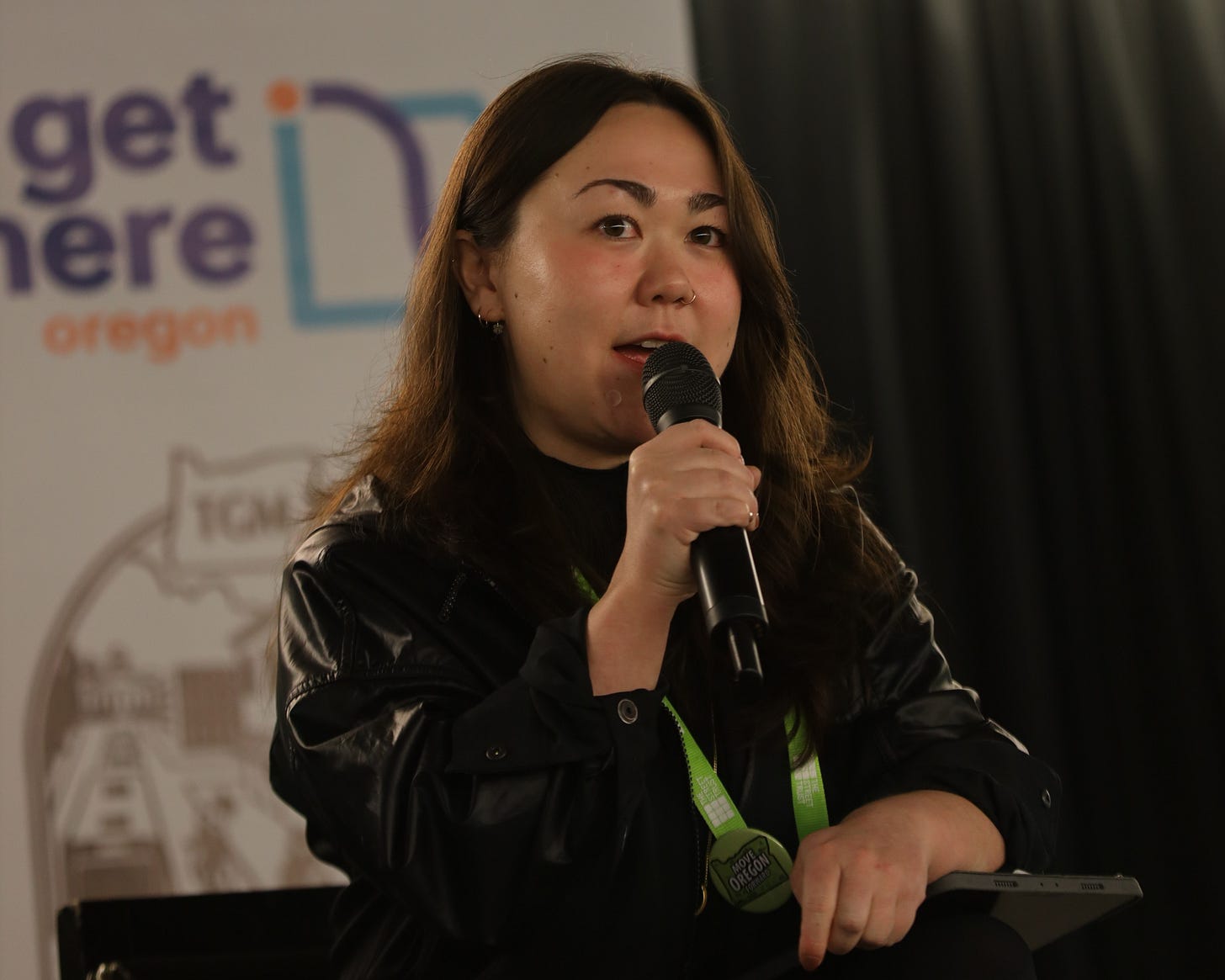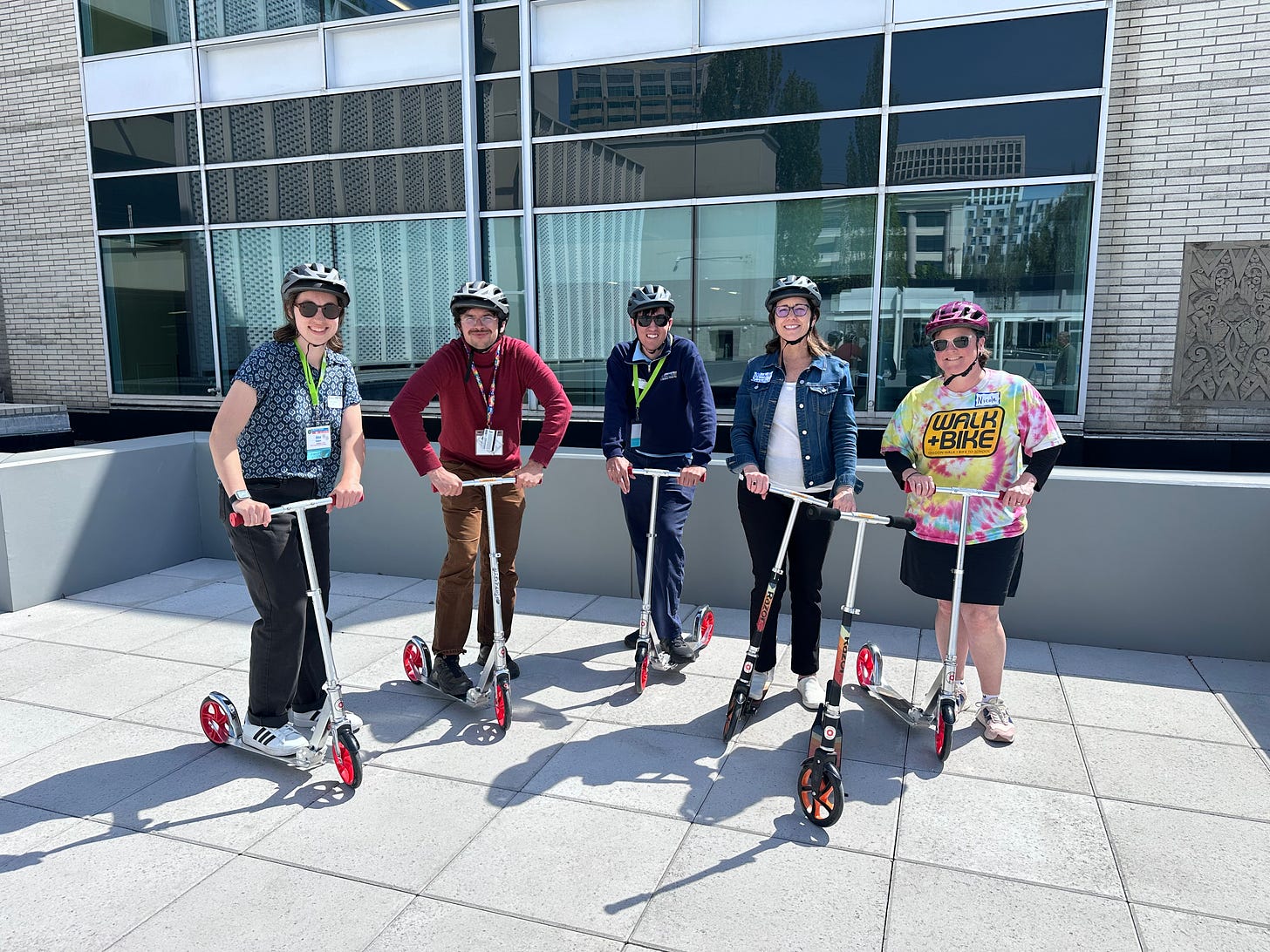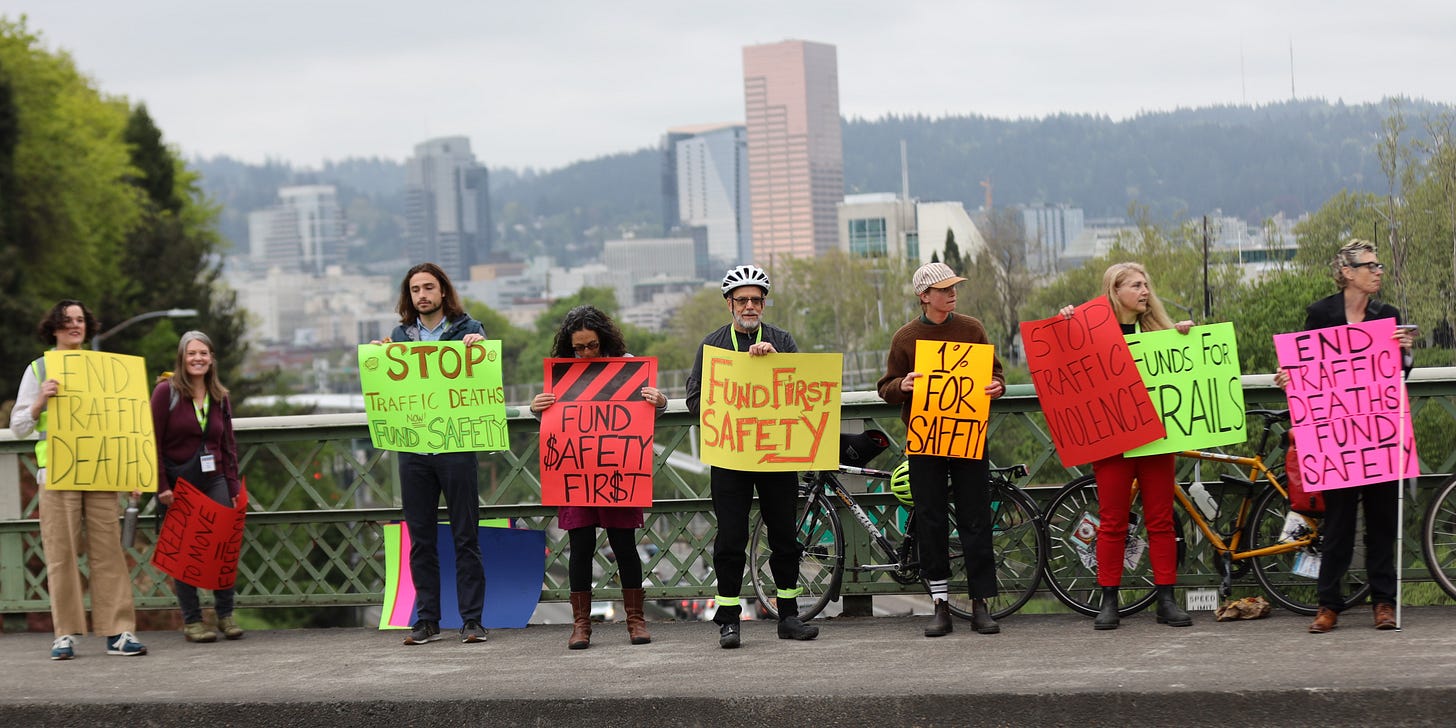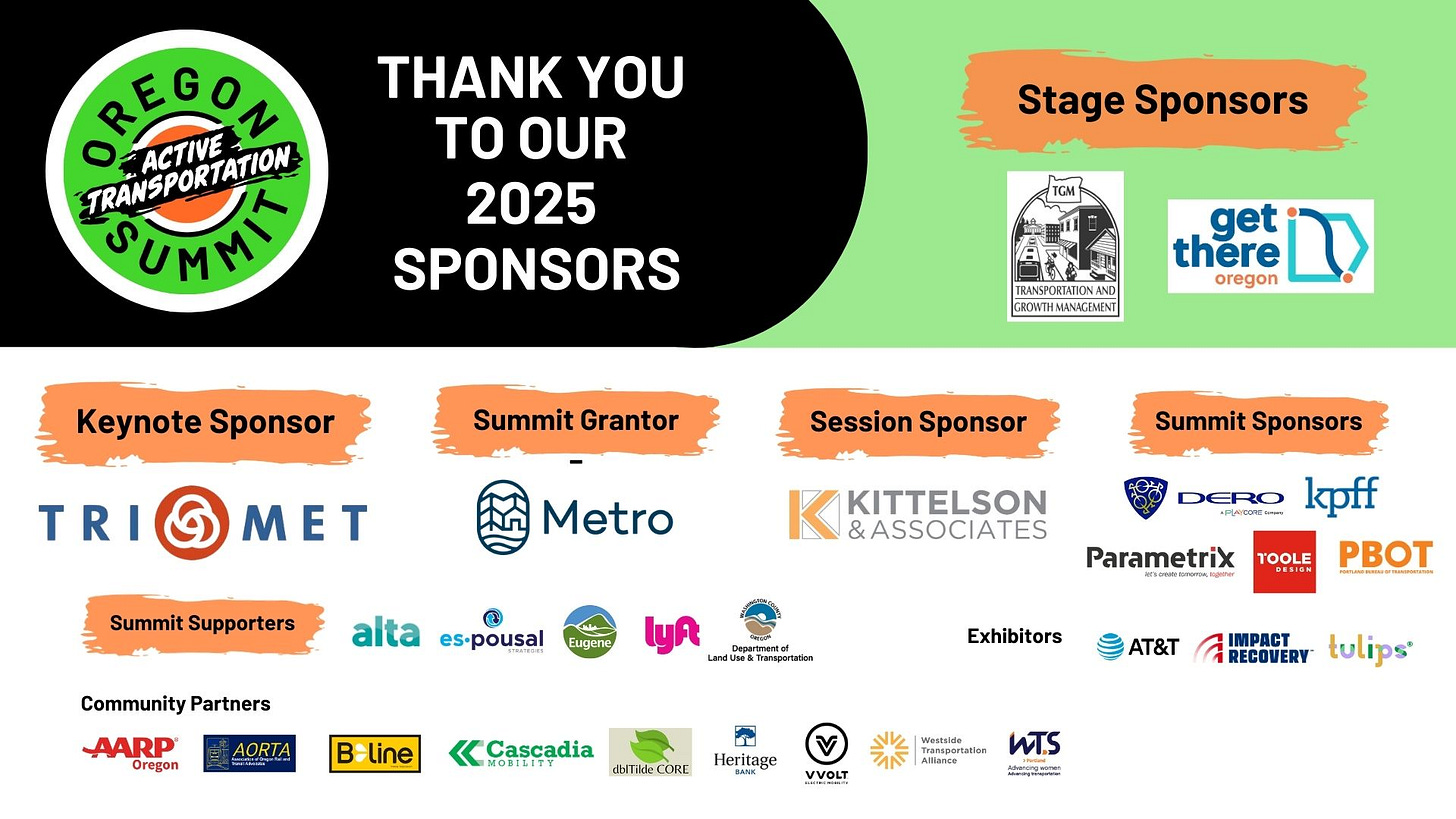OATS 2025 Recap: Critical Mass at a Critical Moment for Oregon Transportation
Exciting developments from the Oregon Active Transportation Summit & how we're continuing the momentum + mobilizing to get the 2025 Transportation Package right

The first day of the 14th annual Oregon Active Transportation Summit opened with an inspiring keynote plenary with special guests sharing their experiences from leading successful, community campaigns for transportation investments and congestion pricing in Seattle and New York City respectively. They reiterated the importance of advocates and lawmakers educating voters on:
How transportation investments will make everyone’s lives better, i.e. the clear, tangible benefits of a modern transportation system!
How revenue mechanisms for funding transportation actually work
The need for better communication and messaging with the wider community was a theme we saw repeated by many speakers during OATS. Other plenaries and panels touched on power-building (Coalitions, Funding, and Impact: Building Effective Bicycle Networks), equity (Infrastructure through All Life Experiences from 8 to 80) and technical issues in the world of active transportation.

Presentations from OATS’ four tracks – Resilience in Action, Fueling the Future, Transportation Trailblazers, and What Matters Most – packed all three rooms of the summit. Attendees bounced back and forth between sessions, and at the end of Day One, our Annual OATS Bike Ride brought everyone together to enjoy the bountiful bicycle infrastructure in the Lloyd District:
Day Two began early with The Street Trust’s Annual Member Meeting. This meeting is where we elect new board leadership, share updates on our progress in the previous year, and start exploring where we’re heading in the year ahead. We are beyond excited to welcome new board members elected this year: Kellie Fenton (Public Involvement Specialist at David Evans and Associates); Eric Hesse (Supervising Planner, Policy Innovation + Regional Collaboration at PBOT); Erik Swanson (Attorney at Immix Law Group); and Hannah Williams (Tolling Community Engagement Coordinator at ODOT).
Our Board Chair Thomas Ngo delivered opening remarks that spoke to the importance of The Street Trust community and our work towards safe, complete streets:
“I’m so grateful to have you here in the fight with us for safe, equitable, people-first transportation. Because this isn’t just about bike lanes or sidewalks. It’s about lives. It’s about justice. It’s about building communities where everyone can move safely and freely.”
As OATS took place about halfway through the long legislative session (Oregon’s legislature convenes for a constitutionally mandated 160 days in every odd numbered year), Executive Director Sarah Iannarone then addressed members about the Transportation Package proposal being finalized in Salem — saying, “We will get out of this transportation package what we put into it.”
She called for everyone to support the Move Oregon Forward (MOF) campaign, a coalition of more than 50 environmental, climate, and transportation advocacy organizations, including The Street Trust. Together we are working to ensure that the package makes essential investments in: 🚨 saving lives from traffic violence, ⛑️ improving health and wellbeing, and 🚍 providing real options for every Oregonian to get where they need to go safely, affordably, and with dignity. Check out our Fund Safety First Checklist for actionable steps to get the Transportation Package that Oregon needs passed… before the scheduled end of the session on June 29th!
Oregon State Representative and Joint Committee On Transportation Co-Chair Susan McLain (D-29, Forest Grove) then virtually joined the OATS main stage for the official opening of the day. Affirming that she and other lawmakers are hearing the demand for safety investments, she reminded us that our continuing action is the only way to get the funding we desperately need for safety and programs like Safe Routes to School in this year‘s transportation package.
The urgent need for us all to mobilize for safety was repeated throughout the summit and reiterated in an op-ed published in The Oregonian during the same period. The op-ed from our Executive Director, in partnership with Rob Zako from Better Eugene-Springfield Transportation and Steph Noll of Oregon Trails Coalition, called for investments in programs that reduce crashes, protect vulnerable road users, and prevent serious injuries and fatalities. The piece lays out how it’s not enough to simply fill potholes — there must be targeted improvements including protected bike lanes, crossings, traffic calming, and safe access to frequent transit.
“Traffic violence is a public health crisis. And it is one we can solve with the transportation package now under discussion,” the op-ed reads. “We appreciate that the framework names safety as a priority, but naming alone does not save lives. If this package does not include sufficient investment in programs specifically built around safety, it will fail.”
The widespread enthusiasm for these essential transportation investments inside OATS was palpable even before Portland Mayor Keith Wilson, Metro Councilor Juan Carlos Gonzalez, and others took the stage following Representative McClain to talk about how transportation solutions spur economic activity. The benefits of transportation investment to job creation and economic development are often-overlooked by decision-makers and the wider community. The panel made it clear that transportation investment is critical to the future of Portland AND Oregon’s rural communities with little bike or pedestrian infrastructure, near-invisible transit, and overall less alternatives to owning an automobile.
Mayor Wilson asked, “When are we going to value bringing our community back and create those town squares?” Wilson asked. “Bringing bike lanes back is just a given." The Mayor’s energetic support for inclusion of safe bicycle infrastructure met raucous applause from the transportation advocates in the room. Mayor Wilson, who has served since January, signaled his intention to prioritize solutions to our housing crisis in his first year, earning political capital he intends to spend in addressing regional transportation needs.

Metro District 4 Councilor Juan Carlos Gonzalez, who chairs the Joint Policy Advisory Committee on Transportation (JPACT), reaffirmed that regional goals from surrounding counties must include basic investments in safety essentials. He noted that different parts of the Metro region are in different phases of development, and investments must be flexible for a region just starting out in adding active transportation versus one with an already mature system.
As he praised Portland’s early and advanced development, he called on attendees to include everyone. “Don't forget about our gente, our families in Clackamas and Washington County,” Councilor Gonzalez said. “They have dreams and they want to walk and bike so everyone can live that quality of life.”
Elissa Gertler, former Planning Director at Metro, and now Housing Manager for Clatsop County, reminded us that rural communities have unique but parallel needs, and that the economic vitality from tourism in our smaller towns and cities is directly connected to the ability of workers to live in and staff those communities’ breweries, hotels and other destinations. “Affordability and participating in your own life resonates no matter where you live,” she said.
Johnell Bell of Espousal Strategies, LLC added that we must ensure development reaches all areas of the state:
“The first thing we should do is to build relationships with folks who don't come from our communities and don't see things the way we see it. The path forward is resolving and breaking down barriers, not to demonize one another.”
Other panels during Day Two covered a wide variety of topics with a focus on seniors, people with disabilities, rural communities, and funding projects in partnership with government organizations. A community “walkshop” took participants on a tour of Old Town, and a BIPOC Happy Hour brought together Black, Indigenous and other people of color in the transportation sector to enjoy drinks and networking after a full day of learning.
On the third morning of OATS, a large rally on the 12th Street I-84 overpass brought together attendees to mobilize on the 2025 Legislative Package in the final stretch before the bill is dropped (any day now). We called for safety funding (a longstanding community demand) and spoke to news outlets about what Oregonians are truly asking for.
Later that morning, members of the Move Oregon Forward community coalition spoke in a keynote plenary moderated by former OPB journalist Jeff Mapes as a culmination of the week’s advocacy. Last summer MOF and The Street Trust were active in organizing Oregonians to turn out for statewide meetings with legislators and to share what their transportation needs and wants truly are. These listening sessions made it clear that investments in active transportation which improve safety and materially improve the day-to-day lives of commuters and students were top priorities for all Oregonians, rural, urban, or suburban.
Organizers with MOF explained their long commitment and overwhelming unity in the face of serious budgetary challenges at the state, county and local levels.

Organizer Indi Namkoong of Verde recalled how MOF “collected all of the verbal and written comments that were made throughout the legislature’s listening sessions here in the middle of Portland, in Eastern Oregon, from the south coast, to the Willamette Valley. And what we heard across the state in every single community, the two things that people spoke about for the most were public transit and safe places to walk and bike. That’s every community and every place in Oregon.”
Day Three of the summit also hosted the annual meeting of Oregon Safe Routes to School (SRTS), the advocates and planners that improve children’s lives and health through community rides and events in conjunction with school districts. Funding for SRTS is a major component of our ask for the 2025 Transportation Package, as it’s an extremely successful and beloved community program that’s produced fantastic results for school children across Oregon.

A mobile workshop showcased how Calaroga Terrace in SE Portland experiences unique transportation needs and challenges. Participants learned about innovative projects in speed management and creating livable neighborhoods. While it’s impossible to recap every workshop, conversation, and insightful remark from our incredible presenters, sponsors, and guests, we hope that anyone who missed the event this year sees just how energizing OATS is for all involved.
Our unique community coming together like we did at OATS is how we will achieve the essential safety investments Oregon needs right now. Now is the time to advocate for, win, build, and maintain the system that our state deserves... please keep up the fight for safe, complete streets by taking action with Our Fund Safety First Checklist.
We are so grateful to our sponsors for their generous support of OATS. Thank you to Get There Oregon and the Transportation and Growth Management Program who served as as joint Stage Sponsors, Trimet our Keynote Sponsor, Summit Grantor Metro Regional Government, Kittelson & Associates, our Session Sponsor, as well as to Dero, KPFF, Parametrix, Portland Bureau of Transportation, and Toole, our Summit Sponsors.







